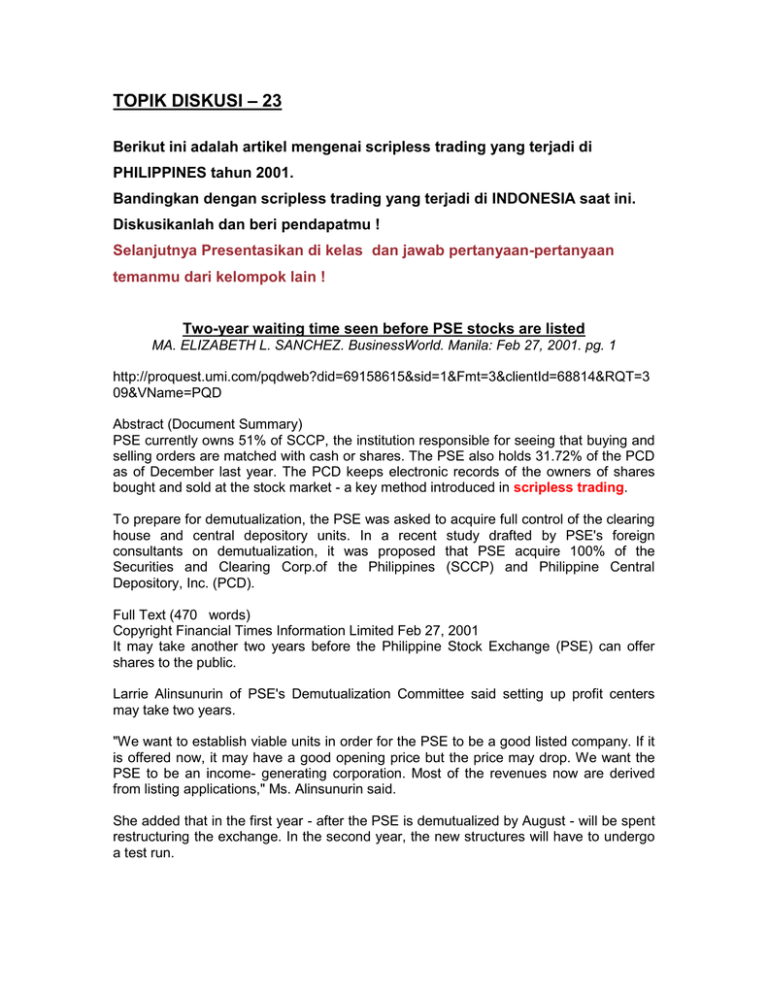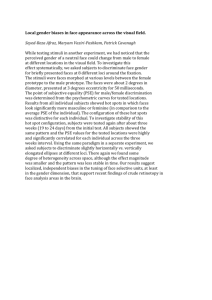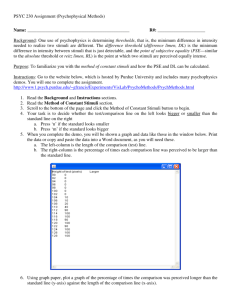– 23 TOPIK DISKUSI
advertisement

TOPIK DISKUSI – 23 Berikut ini adalah artikel mengenai scripless trading yang terjadi di PHILIPPINES tahun 2001. Bandingkan dengan scripless trading yang terjadi di INDONESIA saat ini. Diskusikanlah dan beri pendapatmu ! Selanjutnya Presentasikan di kelas dan jawab pertanyaan-pertanyaan temanmu dari kelompok lain ! Two-year waiting time seen before PSE stocks are listed MA. ELIZABETH L. SANCHEZ. BusinessWorld. Manila: Feb 27, 2001. pg. 1 http://proquest.umi.com/pqdweb?did=69158615&sid=1&Fmt=3&clientId=68814&RQT=3 09&VName=PQD Abstract (Document Summary) PSE currently owns 51% of SCCP, the institution responsible for seeing that buying and selling orders are matched with cash or shares. The PSE also holds 31.72% of the PCD as of December last year. The PCD keeps electronic records of the owners of shares bought and sold at the stock market - a key method introduced in scripless trading. To prepare for demutualization, the PSE was asked to acquire full control of the clearing house and central depository units. In a recent study drafted by PSE's foreign consultants on demutualization, it was proposed that PSE acquire 100% of the Securities and Clearing Corp.of the Philippines (SCCP) and Philippine Central Depository, Inc. (PCD). Full Text (470 words) Copyright Financial Times Information Limited Feb 27, 2001 It may take another two years before the Philippine Stock Exchange (PSE) can offer shares to the public. Larrie Alinsunurin of PSE's Demutualization Committee said setting up profit centers may take two years. "We want to establish viable units in order for the PSE to be a good listed company. If it is offered now, it may have a good opening price but the price may drop. We want the PSE to be an income- generating corporation. Most of the revenues now are derived from listing applications," Ms. Alinsunurin said. She added that in the first year - after the PSE is demutualized by August - will be spent restructuring the exchange. In the second year, the new structures will have to undergo a test run. Demutualization of the exchange refers to the process of converting itself from a nonprofit into a revenue-earning company. This is made possible by formulating a business plan which will expand the PSE's reservoir of revenues. At present, the PSE obtains its revenues from listing and maintenance fees from member companies. Demutualization will also break up the "exclusive" structure of the exchange by diversifying itself into a company owned by shareholders from that held by member stockbrokers. International investment house JP Morgan Chase Securities in Australia also supported the idea of a delayed listing after the demu- tualization of the PSE to wait until key structures are in place. "Importantly, it is vital for a newly listed exchange not to disappoint its shareholders soon after listing. This is because investor confidence, once shaken, is often difficult to reestablish in the short term," Timothy Longstaff, vice-president for JP Morgan Chase Securities in Australia said. He further said that demutualization and listing may not occur at the same time in order to allow the company to prepare for its public offering. "We do not believe that an exchange should list until the transformation from mutual to corporate entity is substantially completed and tested," JP Morgan advised. To prepare for demutualization, the PSE was asked to acquire full control of the clearing house and central depository units. In a recent study drafted by PSE's foreign consultants on demutualization, it was proposed that PSE acquire 100% of the Securities and Clearing Corp.of the Philippines (SCCP) and Philippine Central Depository, Inc. (PCD). This would allow PSE to venture into new services such as clearing and settling sales and purchases of retail managed funds, commodity contracts and short-term money market instruments. PSE currently owns 51% of SCCP, the institution responsible for seeing that buying and selling orders are matched with cash or shares. The PSE also holds 31.72% of the PCD as of December last year. The PCD keeps electronic records of the owners of shares bought and sold at the stock market - a key method introduced in scripless trading.





